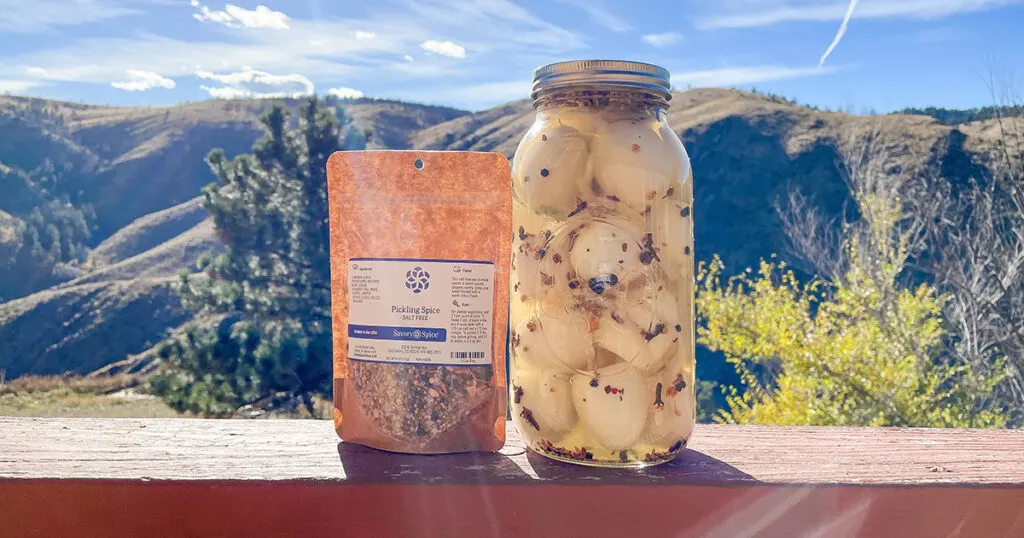In the realm of age-old preservation techniques, pickling stands out as a method that not only extends the shelf life of foods but also enhances their flavor. Pickled eggs, with their tangy taste and firm texture, are a testament to this culinary tradition. Let’s explore the process of pickling eggs and answer some common questions about this time honored preservation method.

Items Needed to Pickle Eggs
- 1 1/2 cups Distilled White Vinegar
- 1/2 cup Water
- 2 Tbsp White Sugar
- 2 tsp Salt
- 1 Yellow Onion
- 2-3 Tbsp Pickling Spices
- 2 Bay Leaves
- Half gallon canning jar
- Up to 24 Eggs
How-to Pickle Eggs
- Hard Boil the Eggs:
- Best method: Easy Peel Hard Boiled Eggs (Instant Pot Method)
- or:
- Place the eggs in a single layer at the bottom of a saucepan or pot.
- Add enough water to the pot to cover the eggs by at least an inch.
- Bring the water to a boil over high heat.
- Once boiling, reduce the heat to low and let simmer for 10 minutes.
- After 10 minutes, remove the eggs from the heat and immediately place them in a bowl of ice water to cool. This will also make peeling them easier.
- Prepare the Pickling Solution:
- In a separate saucepan, combine the vinegar, water, sugar, and salt.
- Bring the mixture to a simmer and heat just long enough to dissolve the sugar and salt.
- Peel the Hard-Boiled Eggs:
- Once the eggs have cooled, crack the shells and peel them. Ensure all shell fragments are removed.
- Layer the Eggs in the Jar:
- In the half-gallon canning jar, start by layering 5-6 peeled eggs.
- Add some thinly sliced onions and pickling spices.
- Continue layering until the jar is almost full.
- Add the Bay Leaves:
- Place the bay leaves in the jar.
- Pour the Vinegar Mixture:
- Pour the prepared vinegar mixture over the contents in the jar, ensuring everything is submerged.
- If there’s not enough vinegar mixture, just top it off with straight white vinegar.
- Seal the Jar:
- Seal the jar lid tightly.
- Store:
- Place the jar in the fridge for up to 6 months (3-4 months is ideal and 1-2 months is best flavor and texture). It’s recommended to let the eggs pickle for at least 24 hours before eating, but waiting for a week yields the best flavor.
Chemical Process of Pickling an Egg
When you pickle an egg, several chemical and physical processes are taking place:
- Acidification: The primary ingredient in most pickling solutions is vinegar, which is acidic. When eggs are submerged in this acidic solution, the pH of the egg’s exterior begins to decrease. This acidified environment is inhospitable to many bacteria and microorganisms that cause food to spoil, thus preserving the egg.
- Osmosis: The salt in the pickling solution draws out some of the water from the egg through osmosis. This further creates an environment that is less favorable for bacterial growth.
- Flavor Infusion: The vinegar, along with any other ingredients like sugar, spices, and herbs, penetrates the egg and infuses the egg white and yolk with flavor. Over time, the egg absorbs these flavors, leading to the characteristic tangy taste of pickled eggs.
- Texture Change: The acidic pickling solution can cause the proteins in the egg whites to denature, leading to a firmer texture. The longer the eggs remain in the pickling solution, the firmer their texture becomes.
- Color Change: Depending on the ingredients used in the pickling solution, the color of the egg white might change. For example, if beets or beet juice is used, the pickled eggs can take on a pink or reddish hue. Similarly, turmeric can give them a yellowish tint.
- Preservation of Nutrients: The pickling process can help preserve many of the egg’s nutrients, ensuring they don’t degrade as quickly as they might in a fresh egg.
Questions and Answers about Pickled Eggs
How does pickling change the taste of the eggs?
Pickling infuses the eggs with the tangy flavor of the vinegar and the aromatic spices, giving them a distinct taste different from fresh eggs. The combination of vinegar, salt, and spices creates a unique flavor profile that many find irresistible.
What is the ideal duration for pickling eggs to achieve the best flavor?
While you can eat the eggs after 24 hours of pickling, allowing them to pickle for a week will result in a more robust and well-developed flavor. The longer the eggs sit in the pickling solution, the deeper the flavors penetrate, offering a more intense taste experience.
Can I use other types of vinegar for pickling?
While distilled white vinegar is commonly used for its neutral flavor, you can experiment with apple cider vinegar or malt vinegar for a different taste profile. However, the acidity level should be considered to ensure proper preservation. Each type of vinegar imparts its unique flavor, so it’s worth trying different varieties to find your favorite.
How long can pickled eggs be safely stored in the refrigerator?
Pickled eggs can be safely stored in the refrigerator for up to 6 months. However, it’s essential to ensure that the eggs remain submerged in the pickling solution to maintain their freshness and flavor.
Is there a difference in texture between freshly pickled eggs and those pickled for longer durations?
Yes, over time, the egg whites may become firmer due to the acidic nature of the pickling solution. The yolk might also become slightly denser, but the overall texture remains pleasant and enjoyable.
Can I add other ingredients or spices to the pickling solution for a unique flavor?
Absolutely! Many people customize their pickling solutions by adding ingredients like garlic cloves, chili peppers, or fresh dill. Experimenting with different spices and herbs can lead to a wide variety of flavor profiles, making each batch of pickled eggs a new culinary adventure.
How can I tell if my pickled eggs have gone bad?
A telltale sign is an unpleasant or off-putting smell when you open the jar. If the eggs have an odd color or if the pickling solution appears cloudy, it’s best to discard them. Always trust your senses; if something seems off, it’s better to be safe than sorry.
Are pickled eggs suitable for individuals on specific diets, like keto or paleo?
Pickled eggs can be a great addition to many diets, including keto, due to their low carbohydrate content. However, it’s essential to check the ingredients and ensure that no added sugars or non-compliant ingredients are used in the pickling process.
Can pickled eggs be used in various recipes, or are they best eaten on their own?
While pickled eggs are delicious on their own, they can also be chopped and added to salads, used as a garnish for sandwiches, or even incorporated into dishes like potato salad for an added tangy kick.
Is the pickling process different for quail eggs or duck eggs compared to chicken eggs?
The basic pickling process remains the same, but the pickling time might vary. Quail eggs, being smaller, might require less time to pickle thoroughly, while duck eggs, which are larger, might need a bit longer. Adjusting the pickling time based on the egg’s size ensures optimal flavor and texture.
In Conclusion: Pickling eggs is a delightful way to preserve and enhance the natural flavor of eggs. Whether you’re looking for a tangy snack or a unique addition to your salad, pickled eggs are sure to impress. Drawing inspiration from traditional preservation methods, like the water glassing technique, pickling is another testament to the culinary wisdom of our ancestors. So, the next time you have some extra eggs on hand, why not try pickling them? They’re a treat that’s both delicious and steeped in history.

Molly
Saturday 30th of December 2023
Once your eggs are fermented, can they be changed over to a water bath canning to be shelf stable? Do hard boiled eggs need to be pickled to be canned for long term shelf stability?
Rob Benson
Saturday 30th of December 2023
The eggs are hardboiled prior to going into the jar. However, you should NOT can these to be shelf stable. You can water glass the eggs to be shelf stable - details, here: https://buckhorncliffs.com/water-glassing-eggs/